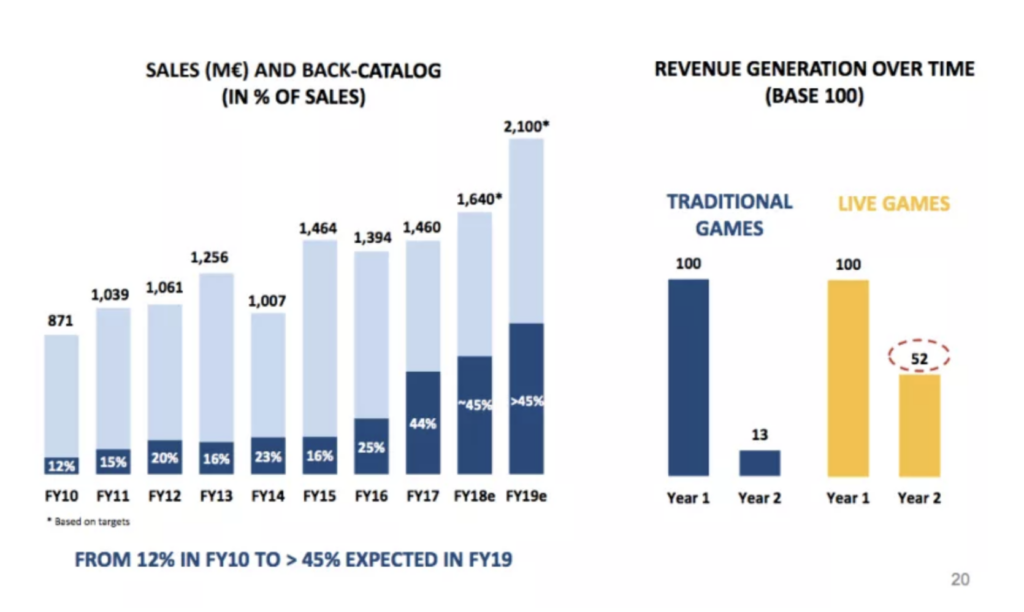Four facts we learned about the future of the gaming industry from E3 2018
Every year, the Electronic Entertainment Expo (E3) churns out enough news, analysis and memes to keep the content-hungry gaming press happy for at least the next quarter. 2018’s conference was no different, with strong showings for games like Cyberpunk 2077, Devil May Cry V, Super Smash Bros. Ultimate and tons more.
But underpinning all those flashy reveal trailers and lengthy gameplay demos are some trends that demonstrate where game devs and publishers believe the future of the industry lies. Not just in the genres they think are going to be popular, but in where the money to support multi-million dollar game development is likely to come. Here are a few of those trends:
Games-as-a-service is still a huge part of the mix
Given the enormous success of games-as-a-service over the past few years, it’s no surprise that publishers are planning to release more games that fit that mould. As James blogged about last year, rather than a one-and-done release that only offers the opportunity to monetise a gaming audience once, games-as-a-service extend the monetisation tail enormously, as this chart from Ubisoft’s earnings earlier this year make clear:

The pertinent figure here is the 52% (far right), a four-fold increase in second-year revenue retention compared to traditional game publishing.
The huge success of GaaS in the MOBA, hero shooter and fighting game genres has pretty much ensured that any new entrant into those spaces tends to be based around that monetisation strategy. For instance, For Honour, the hybrid fighting game that was initially released in February of last year and quickly disappeared from the radar, took steps to bolster its presence by introducing a new faction of characters and maps, suggesting Ubisoft is happy to support a game that by all accounts lost the majority of its playerbase almost immediately, solely for its potential as a GaaS title.
That theory is further supported by the continued existence of another fighter from a storied franchise: While it didn’t have a huge presence at E3 this year, Street Fighter V’s long-term viability is looking considerably healthier than it did in its desultory first year, due to its ongoing rollout of Season 3 content featuring new fighters and arenas.
…but the Lootbox is dead
Really, the writing was on the wall for this as soon as Belgium declared that Lootboxes – essentially a system by which real currency is exchanged for an in-game random item, skin, cosmetic etc – was a form of gambling and therefore illegal. It found that hugely high-profile games like FIFA 18, Overwatch and Counter-Strike: Global Offensive were all in violation of gambling laws – and suddenly game publishers were staring down the very real possibility of a pillar of their monetisation strategies being kicked away.
The practice has been begrudgingly accepted by gamers for years, so when DICE announced that upcoming World War II shooter Battlefield V wouldn’t have any lootboxes whatsoever, the crowd responded with cheers. It looks like while GaaS will be around for the foreseeable future, this one aspect of them might not.
(Points also go to Devolver Digital’s press conference for poking fun at this situation, as well as the ongoing cryptocurrency gold rush with their ‘Lootboxcoin’, which can be bought for a fluctuating amount on their site and proudly has ‘no real value whatsoever’ as a selling point.)
Ninja pirate zombie robot… samurai
A few years ago the hot genre on which everyone jumped was the pirate sim. Assassin’s Creed IV: Black Flag was really the first to jump aboard, and we’ve seen the tail end of that trend with this year’s Sea of Thieves and the slick-looking Skull & Bones.
But this year saw a new genre overtake piratical adventures as the dominant adventure game genre: the samurai game.
From heavily stylised efforts like FROM’s Sekiro: Shadows Die Twice and Nioh 2, to the more realistic (and gorgeous) Akira Kurosawa-inspired Ghosts of Tsushima, this was undoubtedly the E3 of the samurai.
Nostalgia scores big
It’s well-known that gamers are an especially unpleasable group. Any and every change to a beloved franchise can and will be scrutinised and the backlash against any perceived denigration of a series can be damaging to the publisher as a whole. Take the minor backlash to the Command & Conquer franchise being made into a mobile game, for instance, or the reticence around Elder Scrolls: Blades, a perfectly serviceable mobile entry that is perceived to be lacking compared to its franchise stablemates.
The other side of that coin is that publishers can score big points with their fanbases when they resurrect or release a new game in an old franchise. Devolver made a smart choice by choosing to resurrect beloved indie classic Metal Wolf Chaos and the first reactions to Capcom’s remake of Resident Evil 2 have been extremely positive. Undoubtedly the biggest surprises, though, were the reveal of Elder Scrolls VI and the revival of Devil May Cry V after the franchise had been rebooted a few years ago.
Even as the gaming industry grows – with e-sports being a particularly strong area of growth – you can always bank on fan nostalgia for some guaranteed cash.
Chris Sutcliffe
Martin Tripp Associates is a London-based executive search consultancy. While we are best-known for our work in the TMT (technology, media, and telecoms) space, we have also worked with some of the world’s biggest brands on challenging senior positions. Feel free to contact us to discuss any of the issues raised in this blog.